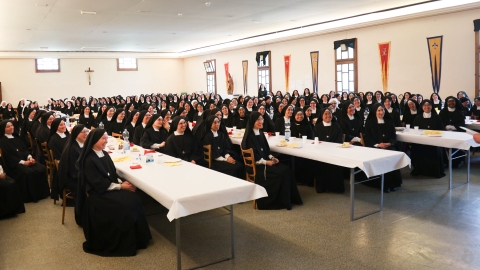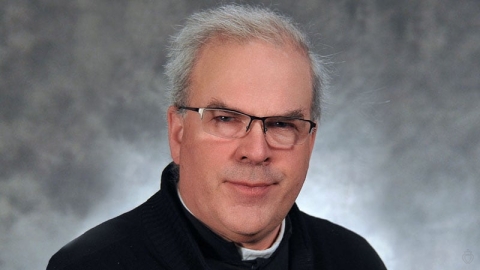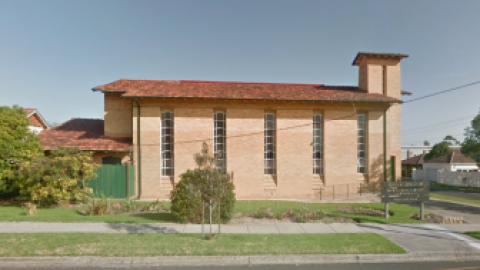Remember, Man, That Thou Art Dust!
Spiritual words addressed to the faithful by Fr. Pascal Schreiber, superior of the Swiss District of the Society of Saint Pius X.
Dear faithful,
Two weeks ago, the liturgy reminded us of the great fragility of humans: “Memento homo quia pulvis es et in pulverem reverteris - Remember man, that you are dust and to dust you shall return.” The priest joined this word with a very strong sign of marking our foreheads with the sign of the cross with blessed ashes.
Who would have thought then that, two weeks later, the whole world would be shaken in its arrogance by a tiny little virus, and would discover its fragility as never before?
Let us then, informed with a deep faith, take a look at these events. Let us first gain some distance and consider these events in the light of Divine Providence, without giving way to the winds of panic, or falling into an irresponsible trivialization. Secondly, let us act as a Christians, and discern what God expects from each of us in these difficult times.
1. What does faith tell us? It affirms that God is our Creator. For us, He is an infinitely loving Father, but also a Father that has given us His law and His Commandments. Since He calls us to infinite happiness with Him, He also asks us to come to Him, to depend on Him, to obey Him.
Our world, for decades, has given less notice to God. On the strength of scientific discoveries, it has believed it could do without Him. Look at all the achievements of modern science: the world has thought itself to have an almost infinite power of domination over nature; it has already imagined being able to extend the life of man on earth almost indefinitely.
But then comes a tiny little virus and all that power is shaken to its foundations.
How good it would be for modern man, and ourselves, dear faithful, to meditate on this text in which God addresses the holy man Job: “Then the Lord answered Job out of a whirlwind, and said: Who is this that wrappeth up sentences in unskillful words? Gird up thy loins like a man: I will ask thee, and answer thou me.
Where wast thou when I laid up the foundations of the earth? tell me if thou hast understanding. Who hath laid the measures thereof, if thou knowest?” (Job 38:1-5).
In a profound style, marvelously full of imagery, God reminds Job of his littleness, not to crush or discourage him, but to get him back to his right place in front of the grandeur of God. Should we not also profit from this sudden awareness of the fragility of our modern world to put ourselves back in our place? Should we not remind ourselves that we are dependent on God for all things, and that without Him we are nothing?
Job had been deeply affected in his health and in his possessions, but he had the sense of God: “the Lord gave, and the Lord hath taken away: as it hath pleased the Lord so is it done: blessed be the name of the Lord!” (Job 1:21). This is the meaning of our dependence on God.
2. Now, dear faithful, we, too, can lose this sense of dependence on God in some way in times of crisis, and react disproportionately to events.
It is for this reason that it seems important to me to show you that there is a happy medium to keep in the face of this pandemic, and when I say “happy medium,” I actually means a “summit.” You have to go higher up! Why?
Because we might be tempted to think that all this excitement around the coronavirus is exaggerated, that it is only a simple flu like all the others, that there is no danger, that praying is sufficient keep from catching it, that taking all these means of protection against it shows a lack of faith or who knows what else? But that is wrong! Consider, for example, that two of the Fatima children, Jacinta and Francisco, died of the Spanish flu. We must therefore face reality: this virus has a higher mortality rate than the seasonal flu. It affects the weaker portion of the population, especially the elderly and the sick, while children do not seem to be particularly suffering, and the contagion is much greater than that of the usual flu. Our civil authorities are therefore right to do what is their proper duty: to protect the weakest.
But we could fall into the opposite excess and exaggerate the dangers of contagion, sink into a kind of panic, cloister ourselves at home, and finally forget that we are in the hands of God. We could forget the beautiful virtue of hope. The words of Christ are so true when He says: “But a hair of your head shall not perish” (Lk. 21:18), or when He consoles His Apostles a few moments before His Passion by saying to them: “Fear not, little flock!”
In fact, our attitude must simply reach the height of the vision of Our Lord, as when He said to the Pharisees: “Render therefore to Caesar the things that are Caesar’s, and to God the things that are God’s” (Mk. 12:17).
Our authorities are prescribing new and draconian measures for us, the repercussions of which are being felt even on our religious practices. In their sphere, they are watching over the common good of society which is entrusted to their authority. During the time of the Spanish flu, in 1918, the authorities of Porrentruy had decreed that “divine services and religious meetings can only be celebrated in the open air and away from built-up areas; that burials will take place without a cortege. Only close relatives can take part.” So this is nothing new, and there should not be any assumption of persecution against the Church. We will therefore follow our authorities in their decisions. “Let us render unto Caesar what belongs to him.”
But we desire much more to render to God what is due to Him.
Right now, no one knows how long this situation will last and it is not impossible that the government measures will harden or last longer. By the grace of God, we can still welcome you to our churches, but the time may well come when we will be forced, despite ourselves, to no longer be able to celebrate public masses. Pray that God will spare us that ordeal!
But whatever happens, let us find all comfort and hope, as well as strength, despite our weakness, in this saying of St. Paul: “to them that love God, all things work together unto good” (Rm. 8:28).
This is why we encourage you with all our heart to take hold of the instrument given by Our Lady to attach us to her Son, the Holy Rosary. Recite it with more fervor, either as a family or in private; pay more attention to it, put more heart in contemplating the mysteries of Jesus, in loving Him with Mary, through Mary. So many victories have been obtained by the Rosary! She is our loving Mother. She is “the all powerful supplicant.” Let us go to Her, and without a doubt she will support us no matter what happens: if we keep our health, to better practice charity; if we fall sick, to be with her at the foot of the Cross and pray for the poor sinners.
Sursum corda – Lift up your hearts!
Fr. Pascal Schreiber, March 15, 2020.
(District de Suisse - FSSPX.Actualités 15.03.2020)





